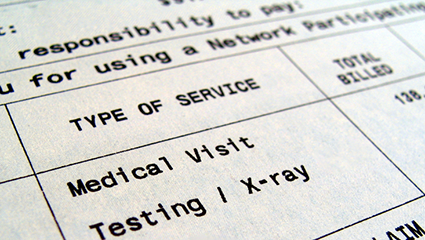Accuracy and completeness in radiology reporting has taken on an even higher level of importance in order to maximize Medicare reimbursement. The Quality Payment Program (QPP) under MACRA highlights the necessity to meet new quality performance standards. While the benefits of structured reporting using templates have been discussed before, including in our article Reimbursement Benefits of Structured Radiology Reporting, reporting on quality measures under the QPP has to include very specific terminology in order to receive credit for the measure. This is an ideal time for radiologists to begin to use standardized reporting across their practice to ensure that all of the critical elements of documentation are met.
The Need for Standardized Radiology Documentation to Maximize Medicare Reimbursements on March 10, 2017
Categories: radiology reimbursement, medicare reimbursement, MIPS, MACRA
How to Be Sure Your Radiology Documentation Supports Proper Coding for Moderate Sedation on March 2, 2017
While certain procedures incorporate moderate sedation (also known as conscious sedation) into their treatment codes, according to modern CPT® guidelines, it is much more common to bill procedures and anesthetics separately. This enables greater specificity in billing regarding time spent and provider involvement. As a radiology practice, maintaining moderate sedation billing compliance is crucial to your financial wellness and practice reputation. Whether you are new to billing and coding or need a refresher, Healthcare Administrative Partners' expertise is here to help.
Understanding Moderate Sedation Coding for Radiology
Previous coding methodology allowed for billing in 15- and 30-minute increments and included code series 99143-99145 and 99148-99150. However, these features became obsolete in 2017. The new standard of radiology moderate sedation documentation includes codes 99151-99153 and 99155-99157, and is based on factors of:
- 15-minute intervals: Intraservice time must be recorded in minutes. You may report the initial 15-minute code once you document at least 10 minutes of intraservice time. Then, you may report each additional 15-minute add-on code once you have provided at least 8 minutes beyond the first 15 minutes.
- Physicians involved: The proper code will vary depending on whether the administering physician is the same physician performing the diagnostic or therapeutic service or a separate person.
- Patient age: There are separate codes for patients under 5 years of age and those 5 or older.
These tables should help you understand which codes apply to which services.
[On-site table 1 - Descriptors]
[On-site table 2 - Total intraservice time]
*Note that for Medicare, 99153 is a technical-only add-on code in facility settings. It is packaged into the facility payment and is not separately reimbursed to the physician — physicians are only paid for 99151 and 99152 codes.
How to Document Moderate Sedation Properly
With all this information in mind, every moderate sedation record should provide these key pieces of data:
- Patient age
- Physician(s) name(s)
- Physician or physician's clinical need for participation
- Intraservice time (total time in minutes and start/end time stamps)
- The term “moderate” or “conscious” sedation
- Any pre- or post-sedation monitoring and assessments
- Pre- and post-sedation work the physician performs
Here is an example of good documentation for moderate sedation:
Moderate intravenous conscious sedation was supervised by Dr. X. The patient was independently monitored by a Registered Nurse assigned to the Department of Radiology using automated blood pressure, EKG and pulse oximetry. The detailed Conscious Record is permanently stored in the Hospital Information System. The following is the conscious sedation record including Start and End times: MEDS GIVEN 4 MG VERSED AND 200 MCG FENTANYL; SED START 1503 END 1531, FOR 28 MINUTES.
Stay Informed and Supported at HAP USA
Proper coding allows radiology practices like yours to obtain the maximum reimbursement for the services you offer, promoting long-term financial integrity that allows you to continue serving patients in need. Healthcare Administrative Partners is dedicated to helping providers optimize their performance with expert revenue cycle management advice and solutions. Stay up to date on the latest industry news when you subscribe to our blog. Or, contact us directly to learn more about how we can actively support your operations.
Categories: radiology documentation, radiology coding
Assessing the Impact of High Deductible Health Plans on Radiology Practices on February 16, 2017
Before the days of managed care, insurance plans were “indemnity coverage” that reimbursed patients for their out-of-pocket costs. Physicians billed the patients and got paid when the patients felt like making payment, usually only after the insurance company had reimbursed them. Often, the insurance money went elsewhere in the patient’s budget and the physician waited for payment. The not-so-good old days! With the advent of managed care contracting where physicians were paid directly by the insurance company, patient balance collections mostly disappeared. Today the pendulum is swinging back in the opposite direction, requiring practices to once again face the necessity to collect significant balances from patients.
Categories: radiology reimbursement, radiology billing
One Simple Way a Radiology Group Added Value to Their Hospital Relationship on February 4, 2017
If you follow the leading voices in the radiology community, you know that the topic of “value” is a recurring theme of current conversations. It is a core concept behind Imaging 3.0 and has dominated recent seminars, webinars, social media chatter and more for months thanks to MACRA and the many changes it is bringing to provider compensation models. And whatever changes the next wave of governmental healthcare policy washes into the boardrooms of group practices, when the murky waters recede, it is a safe bet that proof-of-value will still remain on the table as a mandate for radiologists going forward.
Categories: radiology billing, radiology value building
Transitioning Your Radiology Practice to MIPS: Improvement Activities on February 2, 2017
This is the third in our series of articles designed to help radiology practices prepare for the Merit-Based Incentive Payment System (MIPS). Previous articles covered the Quality Performance Category, which is the largest portion of the MIPS score, and the Advancing Care Information (ACI) Category. Quality will initially account for at least 60% of the total MIPS score and ACI will account for up to 25% of the total score. The Improvement Activities (IA) Category, originally called the Clinical Practice Improvement Activities in proposed regulations, represents 15% of the total score for 2017, the first year of MIPS participation. The fourth element of MIPS, the Cost Category, has been reweighted to zero for 2017.
Categories: radiology reimbursement, MIPS, Quality Payment Program
Maximize Mammography Coding and Billing Efficiency in 2017 on January 28, 2017
Medicare publishes its rules and requirements for the coding and billing of medical procedures to obtain reimbursement under its programs, but many commercial insurers are not as transparent about their own requirements. This leaves medical billing professionals in the dark when there are new procedure codes or changes to existing coding in the American Medical Association’s CPT® code set or by federal regulation. Such is the case with mammography coding for 2017. Below we have summarized the key coding considerations for radiology practices billing mammography services this year. (Click here to read our complete article on the 2017 coding changes impacting diagnostic and intervential radiology.)
Categories: radiology reimbursement, radiology coding, breast imaging
2017 Interventional Radiology CPT Codes Update | HAP USA on January 27, 2017
Click here to read our 2024 code changes update article.
The annual cycle of revising codes in the Current Procedural Terminology (CPT)® has been completed with the issuance of the Medicare Physician Fee Schedule (MPFS) Final Rule for 2017. For diagnostic radiology, the changes this year are in mammography bundling, ultrasound screening for abdominal aortic aneurysm, and fluoroscopic guidance. Interventional Radiology (IR) will also be subject to bundling and other rearranging of codes for certain procedures. Finally, there are new codes that have been created to describe procedures previously unlisted, which generally will improve reimbursement for those procedures, and codes deleted from use, which will return the affected procedures to the ‘unlisted’ category.
Categories: radiology reimbursement, radiology coding, interventional radiology, IR coding, CPT codes
Why the MIPS Patient-Facing Rules are Important to Radiologists on January 19, 2017
Physicians and other Eligible Clinicians (ECs) who are participating in MIPS under the MACRA rules governing Medicare payments will face requirements that differ depending on whether they are deemed to be “patient-facing” or not. This determination will affect the Advancing Care Information (ACI) and Improvement Activities (IA) components, but not the Quality Performance component of MIPS. In this article, we’ll break-down the key considerations for radiology practices.
Categories: radiology reimbursement, medicare reimbursement, MIPS, MACRA
Transitioning Your Radiology Practice to MIPS: The Quality Component Updated on December 15, 2016
By now everyone involved in billing Medicare for physician services should be aware of the new Quality Payment Program (QPP) that will be in effect for payments in 2019 based on data submitted in 2017. The proposed rules for the new system were outlined in our recent article Medicare Quality Reporting Rules are Changing. The final regulations that will govern the new system were recently issued, and radiology practices will benefit from preparing as early as possible to capture the data they will need to report under the new system.
Categories: radiology reimbursement, medicare reimbursement, MIPS, Quality Payment Program
Regulatory Changes Affecting Radiology Reimbursement in 2017 on December 10, 2016
Looking for our latest article on the 2018 updates? Click here.
Congress has passed several Acts related to the Medicare payment system over recent years, the provisions of which will begin to take effect in 2017. These changes are embodied in the annual Medicare Physician Fee Schedule Final Rule for 2017 (MPFS) and the Hospital Outpatient Prospective Payment System Final Rule for 2017 (HOPPS). In their initial review of the MPFS, the American College of Radiology (ACR) indicated that it “is pleased with several provisions within the rule.”
Categories: radiology reimbursement













